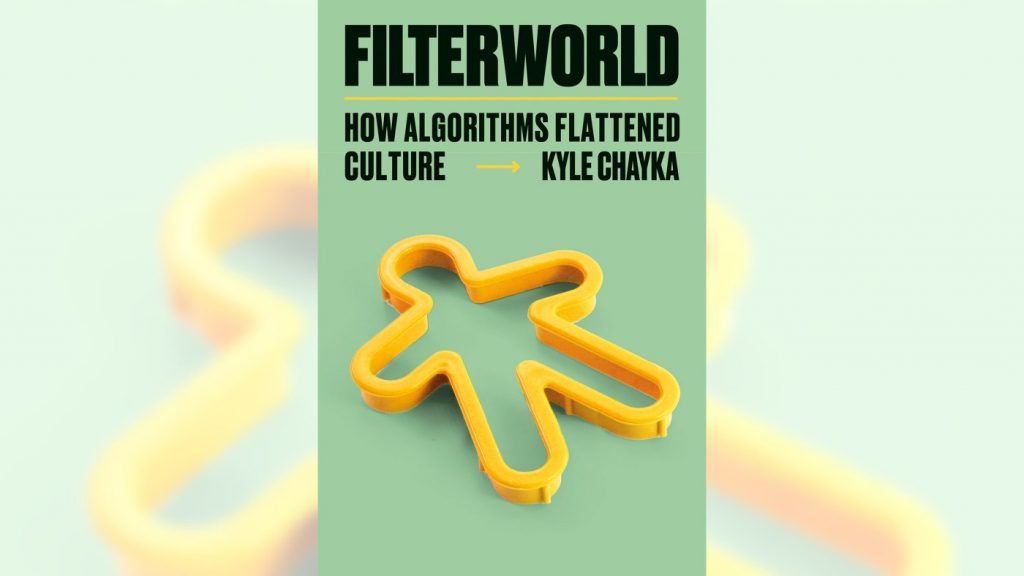Partway through Kyle Chayka’s new book, “Filterworld,” about how digital algorithms transform culture, a quote from one of his subjects stopped me cold.
Valerie Peter, a younger woman interviewed for the book, had never liked legwarmers. But in late 2021, legwarmers became a pervasive fashion trend on Instagram, TikTok and Pinterest. She felt compelled to buy a pair. The decision felt almost subconscious, disturbingly so. It were as if clout-chasing influencers and surveillance-based digital advertising had somehow corrupted her self-identity.
“I just want to know that what I like is what I actually like,” Peter said.
Good luck, I thought. I pictured the ending from Alex Garland’s 2018 sci-fi film “Annihilation,” where Natalie Portman’s character, Lena, confronts a faceless extraterrestrial that mimics, with growing violence, her every move. It’s the strange dance of today’s surveillance economy: Users give platforms data, which platforms use to adapt to the user (and sell more precisely targeted ads), which in turn better adapts the user to the platform. Every algorithm-driven platform is an alien lifeforce that acts more like you over time, even if it’s enabling your belief in a conspiracy theory or dangerously reinforcing a depressive episode.
“Algorithmic recommendations are addictive because they are always subtly confirming your own cultural, political, and social biases, warping your surroundings into a mirror image of yourself while doing the same for everyone else,” Chayka writes. “This had made me anxious, the possibility that my view of my own life — lived through the Internet — was a fiction formed by the feeds.” So he went on an algorithm cleanse and quit social media, going cranky from the cognitive withdrawal at first. He read David Brooks out of sheer boredom. Took fewer photos. Gained clarity.
In “Filterworld,” Chayka, a writer who covers technology and internet culture for the New Yorker, uses taste as the primary lens through which to explore this cycle of adaptation and alienation that now defines our encounters with many tech platforms. Chayka’s view is that the proliferation of recommendation algorithms on services like Netflix, Spotify and TikTok since the 2010s have created a cultural world that’s flatter, more homogenous and more passively consumed. The book is part of a long-building, now-maturing backlash against the uncanny mental world, our world, that the tech industry has built over the past two decades.
“In place of the human gatekeepers and curators of culture, the editors and DJs, we now have a set of algorithmic gatekeepers,” Chayka writes. “While this shift has lowered many cultural barriers to entry, since anyone can make their work public online, it has also resulted in a kind of tyranny of real-time data. Attention becomes the only metric by which culture is judged, and what gets attention is dictated by equations developed by Silicon Valley engineers.”
If taste — aesthetic judgment — is a human skill cultivated by a lifetime of gazing, reading, listening and selecting, recommendation algorithms are like the new robots powering up to take over the assembly line of our intentionality. These mathematical helpers reduce selection time and boost the efficiency of seeing pictures, watching TV shows and hearing songs: more and faster.
Meanwhile, the humans who used to browse the shelves in libraries or at Blockbusters become button-pushers a little less good at looking around. No need to stress over finding the right album for your mood anymore. Just listen to this Spotify playlist of lofi beats to relax to.
Whenever your environment gets automated, you become a little more of an automatic person. “There are ‘lean-in’ moments, when the user is paying attention, choosing what to consume and actively judging the result,” Chayka writes of active and passive modes of content consumption on platforms. “And there are ‘lean-back’ moments, when users coast along with content running in the background, not worrying too much about what it is or what plays next. Algorithmic recommendations push us toward the latter category, in which we are fed culture like foie-gras ducks, with more regard for volume than quality — because volume, sheer time spent, is what makes money for the platform through targeted advertising.”
Time to rebel! I for one, as a former English major, am vulnerable to humanities-based arguments of decline; our lives (or at least our moods) might improve modestly if we went around smashing a few more machines. Nonetheless, Chayka’s version of taste is an unreliable instrument for establishing the extent that Big Tech is achromatizing the last bit of color out of our souls. A much older cultural anxiety is also afoot here.
Chayka defines taste as an elevated subjectivity, a way you consciously place yourself both within and against the world: “We make constant decisions to listen to, read, or wear one thing instead of another. These choices are intimate, reflecting our ephemeral moods and the slow building of our individual sensibilities — of our senses of self. … Taste is a word for how we measure culture and judge our relationship to it.”
Taste is how you discriminate, in the most neutral sense of that word. But later, the emphasis on taste, a capacity theoretically any human has, shifts toward good taste, a quality of the few rather than the many: “When taste is too standardized, it is degraded. … Consumption without taste is just undiluted, accelerated capitalism.” A whiff of social status drifts in: “There are two forces forming our tastes … the first is our independent pursuit of what we individually enjoy, while the second is our awareness of what it appears that most other people like, the dominant mainstream. The two may move in opposite directions, but it’s often easier to follow the latter, particularly when the Internet makes what other people are consuming so immediately.”
So if everyone else is jumping off the bridge of Marvel’s “Madame Web” (12% critics rating on Rotten Tomatoes, 57% audience score), you don’t have to follow them. Go listen to some 12-tone Schoenberg string quartets and commune with God, and your selfhood will remain secure.
But Chayka’s valid analysis of how algorithmic curation dulls our creative agency overlaps messily with the centuries-old anxiety of the aesthete within modernity, where all subjective opinions are ultimately equal, never more-so than in the marketplace. “These days the fee even for authors of repute is very small, whereas the tips dropped to the literary hacks are very considerable,” Danish philosopher Søren Kierkegaard bemoaned in 1846.
What the internet performs, and what platforms perfect, is an occult crowd summoning that illustrates just how outnumbered and irrelevant the snob really is. Picture the food critic from “Ratatouille,” Anton Ego, standing amid the biggest never-ending Black Friday mall crush in human history, and you’ve got an idea of how it feels to create a Substack newsletter in 2024 to write some literary essays for the web.
This particular flattening effect of platforms comes less from the rise of manipulative algorithmic whizbangery than the sheer presence of other people and the consumer purchasing power they represent. “In the place of physical hotels and airports, we have Twitter, Facebook, Instagram, and TikTok as spaces of congregation that erase differences,” Chayka writes. “There is now also the generic global consumer, whose preferences and desires are molded more by the platforms they use than where they live.” Access to a massive global market, combined with powerful analytics and social media feedback effects, create ever-more powerful incentives for even genius creatives to give the crowd the mush it wants.
Related Articles
Marketing magic: How influencers are helping sell psychedelics to social media masses
Facebook and Instagram outage: Widespread disruption resolved
French: Why Elon Musk is the second most important person in MAGA
Opinion: How Supreme Court should rule on Texas and Florida social media laws
Award-winning Bay Area librarian and TikTok star resigns
Rotten Tomatoes is one of those places where you can still watch the old culture fight the new in a grotesque pit. (Isn’t my love for romantic schlock like 1997’s “The Saint,” starring Val Kilmer in an absurd number of disguises, just as valid as the British Film Institute’s adoration of “Jeanne Dielman, 23, quai du Commerce, 1080 Bruxelles” as the greatest film of all time?) The review-aggregation website has different percentages to measure the mood of the experts versus the mood of the masses, kind of like a weather forecast that tells you what kind of class warfare the new “Spider-Man” is unleashing this week.
“The behavior of these social media hordes represents an anti-democratic, anti-intellectual mind-set that is harmful to the cause of art and antithetical to the spirit of movies,” longtime New York Times film critic A.O. Scott bemoaned in a farewell essay explaining why he was leaving film criticism. “Fan culture is rooted in conformity, obedience, group identity and mob behavior, and its rise mirrors and models the spread of intolerant, authoritarian, aggressive tendencies in our politics and our communal life.”
So let’s say all this consumer unthinkingness and the enclosure of new intellectual possibilities is incipient fascism. Unplug to end the alien dance and go find yourself: the authentic you, away from the data surveillance, away from the crowds. It will almost certainly be more restful, as Chakya found.
But trying to find some neighborhood of your city that hasn’t been impacted in some way by an internet platform is like searching for a corner of Earth untouched by climate change. Google and Waze have changed cities’ traffic patterns; Yelp directs eaters to some restaurants over others, influencing which ones close and which survive; Spotify playlists are running in the the restaurant you picked; TikTok fashion trends are reflected in the clothes of the people you see; people have transformed their own faces in pursuit of homogenous Instagram beauty standards.
The digital is the real. Recommendation algorithms, the companies that control them and the crowds that use them have already recreated the world. What matters most isn’t an unattainable sense of individual authenticity — you’re not some Philip K. Dick cyborg who can sync up and cycle back to factory settings, purging the hard drive to compress yourself just small enough to slip through the firewall of human history. What’s achievable for proper people is a better collective competency about what the platform economy does to us and what it wants us to do next. That’s when we can choose to do something different, if we want. Call it a matter of taste.
____
“Filterworld”
By Kyle Chayka
Doubleday Books: 304 pages, $28
©2024 Los Angeles Times. Visit at latimes.com. Distributed by Tribune Content Agency, LLC.


